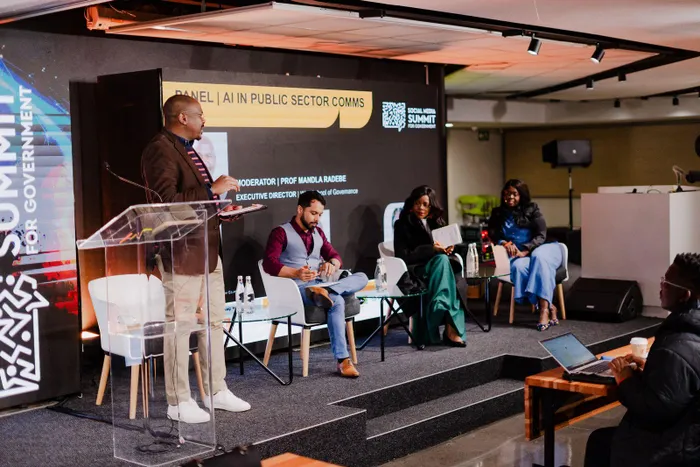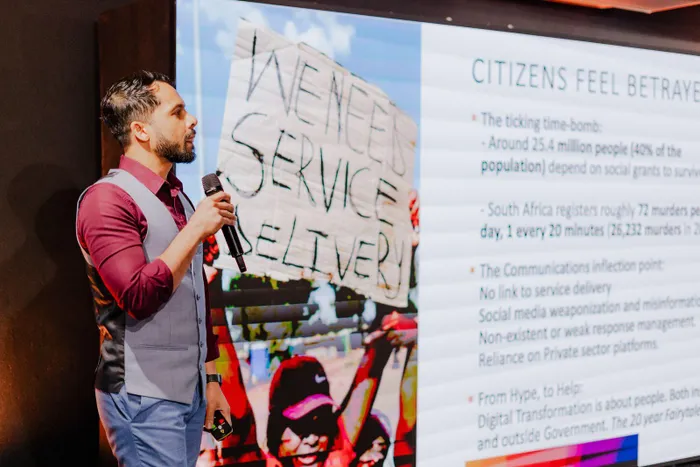
Artificial Intelligence (AI) should be used not only to enhance communication but also as a key driver of development and inclusion in South Africa.
Image: Supplied
Artificial Intelligence (AI) should be used not only to enhance communication but also as a key driver of development and inclusion in South Africa.
This was the view of experts during a panel discussion focusing on the role of AI in public sector communication at the Social Media Summit for Government at the University of Johannesburg (UJ) on Tuesday.
The summit comes amid growing debates and concerns over AI’s rise around the world, with fears that it could replace professional judgment and jobs.
The panel, moderated by Prof. Mandla Radebe, Executive Director of the Centre for Data and Digital Communication at the University of Johannesburg, brought together thought leaders from government, communications, and legal fields to discuss how AI can be responsibly integrated into public service.
“We need to stop just looking at AI as a tool for communication, but also as a tool for development,” Dr Caroline Azionya from the Public Relations Institute of Southern Africa (PRISA) said.
“Data is a value-creating resource, and if used correctly, it can streamline processes and bring about real growth.”
Aslam Levy, Deputy Director-General for Digital Governance, also provided insight into the Western Cape government’s approach to digital services that consider the realities of impoverished communities.

Aslam Levy, Deputy Director-General for Digital Governance, also provided insight into the Western Cape government’s approach to digital services
Image: Supplied
“70% of the people who interact with us are chronically impoverished. So when we design, we design for the lowest common denominator. Our services are mobile-optimised, and we guide users step by step. We don’t just assume they know how to use the technology.”
Levy described efforts like mobile digital hubsvehicles equipped with internet access, and digital facilitators that visit rural areas to help people with internet use and digital skills such as writing CVs.
On the broader AI question, Azionya, however, warned against uncritical reliance on AI-generated content.
"It does lie. It causes hallucinations. So, from a reputational point of view, it's very important for you to ensure that you verify the information that you send out so that you don't bring the government into disrepute for the department that you're working for," Azionya said.
"I think that's the most important thing. And then, through being consistent, you then become a trusted source of information for the citizens. I think you have to be very intentional about that and understand that AI is there to augment your skill set, not to replace your skill set".
Leah Molatseli, Legal Tech and Innovation Specialist, pointed out that there were still challenges with AI regulation in government. Last year, South Africa introduced the National AI Policy Framework, but there are still no detailed laws to enforce or guide its implementation.
"I think the biggest one is that in essence, they don't exist. They're either scattered or it's still very on a contextual basis. Very high level, this is what we need to do".
Molatseli also stressed the risks of public servants using AI tools without proper safeguards, potentially exposing sensitive government data.

Artificial Intelligence (AI) should be used not only to enhance communication
Image: Supplied
"But it's not broken down in such a way that a professional can actually be guided to say this is what I can do, this is what I can't do. I mean, I'm hearing a lot of conversations around CHAT-GPT, but it's still a public platform. So what you're doing when you're sharing public government information on a tool like CHAT-GPT is exposing us".
The panel also urged investment in AI solutions tailored for the country's diverse linguistic and cultural landscape.
“We should be training language models that understand our 11 official languages.The onus isn’t on Google to do this work. It’s on us," Levy added.
